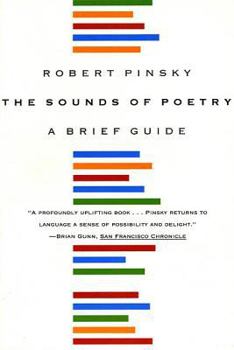The Sounds of Poetry: A Brief Guide
Select Format
Select Condition 
Book Overview
The Poet Laureate's clear and entertaining account of how poetry works.
Format:Paperback
Language:English
ISBN:0374526176
ISBN13:9780374526177
Release Date:September 1999
Publisher:Farrar, Straus and Giroux
Length:144 Pages
Weight:0.38 lbs.
Dimensions:0.5" x 5.0" x 7.5"
Customer Reviews
5 ratings
Excellent introduction
Published by Thriftbooks.com User , 17 years ago
Robert Pinsky's The Sounds of Poetry is an invaluable guide to the most critical--and one of the most neglected--aspects of poetic writing: sound. I first read this book when taking an undergrad poetry-writing course, and I found it immensely helpful. Pinsky takes a great deal of potentially clunky, academic information and distills it into a fast, easily-digestible handbook. In just over 100 pages, he outlines the essentials of rhythm, meter, the meaning carried by sounds, and the interrelation of all three. For anyone who has read, studied, or written poetry before, there won't be much new here, but having so much good advice in such a concentrated form makes this little book an excellent read. Even several years after taking that course, I still find myself browsing this book, looking for helpful reminders and inspiration. Pinsky's book is not only helpful and informative, it's a fast, fun read--it both delights and informs. Horace would be proud. Highly recommended.
Not a dull manual
Published by Thriftbooks.com User , 19 years ago
Don't be deceived by the bad reviews you see from a few others here. What likely disappoints them about this book is its refusal to be useable, to give a method to read or write rhythm, to make illusory markings of beats or syllables. Far from reducing poetry to a scheme, Pinsky brings out the uniqueness of every line, every sounding of words together. He shows how the power of a poem involves tones and speeds and flows of sound played against subtle turns of syntax. He shies away from neat categories of verse. Instead, he'll show marvels, such as iambic pentameters within Ginsberg's "Howl." Not only can you learn about poetry here, but find such sentences as: "The emotion, the sexual horniness, produces an artifact of extravagant control." Rather than a book to pick up for practice or study, I found it was hard to put down.
fundamental, crucial stuff to be aware of
Published by Thriftbooks.com User , 21 years ago
for an appreciation of poetry. The sounds of poetry were one of the most important aspects of western poetry before Homer, when the sounds were integral pnemonics for poems to be remembered by many people in many places for long times. Homer's epics were known by rote for their sounds. Language's sounds & music are still one of the most important aspects of poetry today; I think they always will be. Poetics run deep, & with poetry so much is invested in the sounds. This is absolutely the best resource I know for a student of poetry to begin to develop an ear for poetry. To continue to develop it of course you need to care, & you need to read. Pinsky has been doing great services to poetry throughout his career as poet & scholar. I hope this review has been useful to you.
Will make you more aware about how poetry sounds!
Published by Thriftbooks.com User , 23 years ago
I have been a fairly big poetry fan for awhile now, but never have been able to pick up how subtle poetry really is. If you are like me and have read poems before, and have felt the frustration in not being able to explain why they sound so wonderful, this book is for you. For instance, who would have known that juxtaposing words with Germnaic and Latin roots can often produce a pleasing effect? Pinsky will allow you to pick up on this.Some have said that Pinsky is dry and condescending in this work. It's true, Pinsky talks about poetry in a way devoid of all mysticism, but I think this no-nonesense and more objective approach is wonderful. Additionally, I don't see any actual condescension in the work. P's goal is not only to be simple, but also to show how misleading usual terminology can be. However, paradoxically, it is knowledge of what this terminology means and how it is useful, along with how Pinsky's ability to describe how subtle the sounds of poetry are that will teach you how to talk about poetry intelligently, if only with yourself.
Enhanced poetry appreciation
Published by Thriftbooks.com User , 25 years ago
This is obviously not the first book to explore poetry from an angle other than the meaning of its words -- for another example, see John Ciardi's "How Does a Poem Mean?". Nonetheless, it's a very readable discussion of one of the things that distinguishes poetry from prose -- the importance of how it sounds, either spoken aloud or spoken in the reader's mind. I love to read poetry, and this book has given me a new layer of understanding -- both of poems themselves and of what I enjoy about them.





